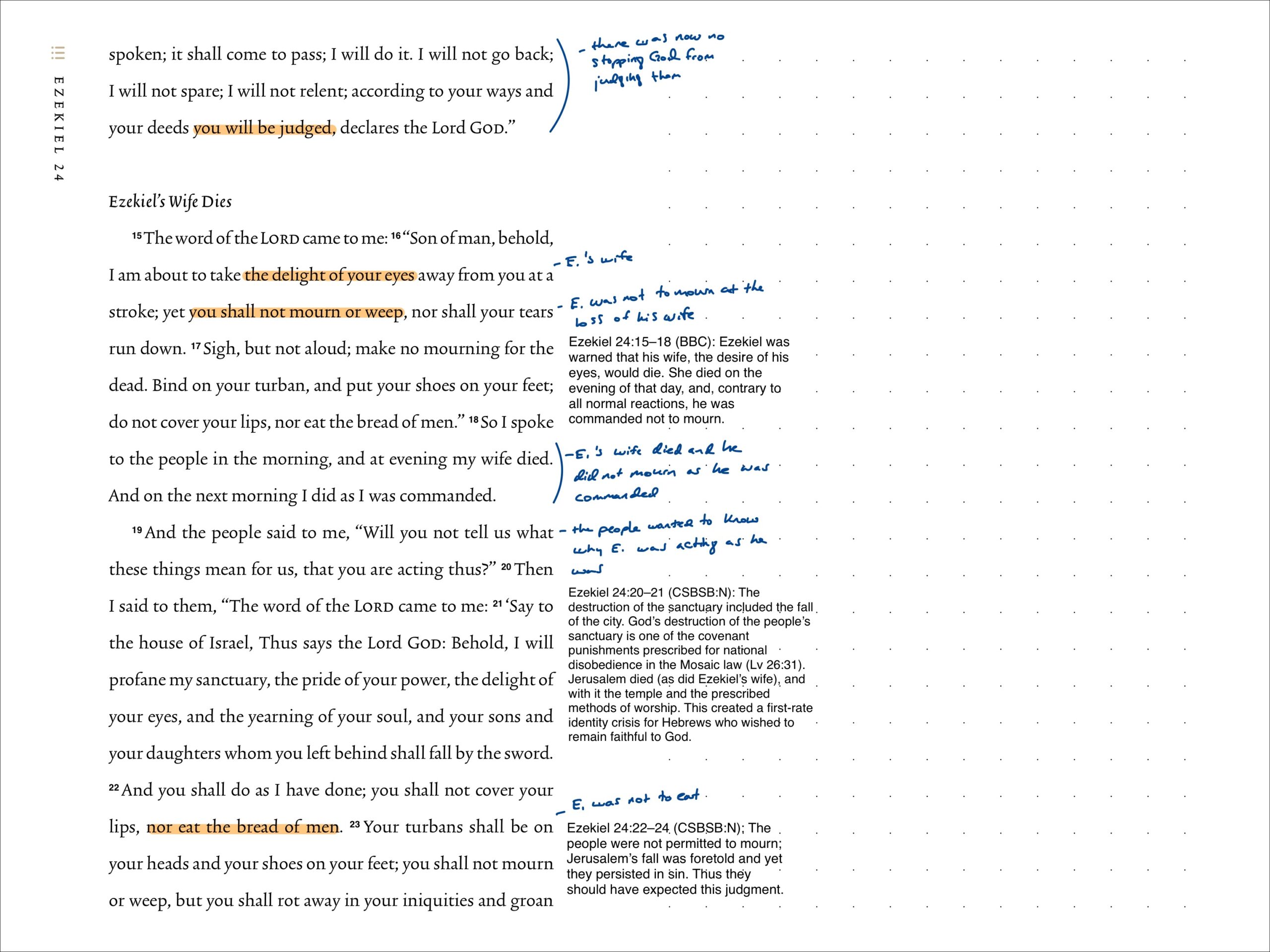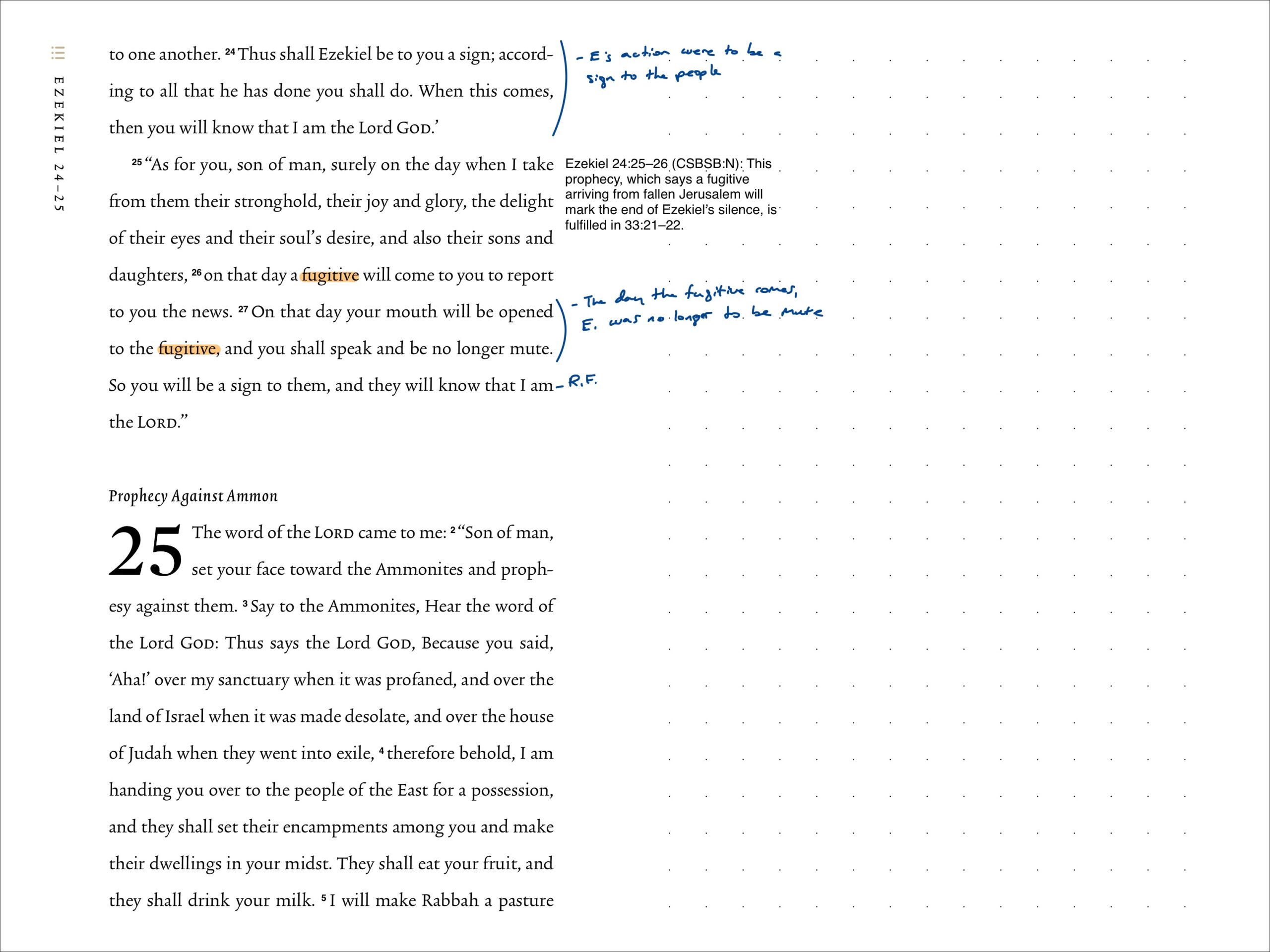| Date | Version | Reading Plan |
|---|---|---|
| @September 14, 2023 | ESV (2016) | ESV Prophets Plan 2023 |
Pericopes
- The Siege of Jerusalem
- Ezekiel’s Wife Dies
Notes
The chapter opens with a command of Ezekiel by God to “write down the name of this day”. The date of this prophecy is significant. This was the day that Nebuchadnezzar’s siege of Jerusalem began in January of 588 BC. Later in Israel’s history the date became an appointed fast day and was observed as early as the time of the prophet Zechariah (Zech. 8:19). This was the day Ezekiel had been pointing to for more than four years. The date was so significant that it was also mentioned by the writer of 1 and 2 Kings (2 Kings 25:1) and by the prophet Jeremiah (Jer. 39:1; Jer. 52:4).
In Ezek. 3b-14, God tells Ezekiel to “set on the pot” which was Jerusalem. He was to put in “the pieces of meat” which were the people and to bring it to a boil (Ezek. 24:5). The pot had scum, or rust, in it which was the lewdness of her idolatry (Ezek. 23:6). This was to be burned after the pot was emptied (Ezek. 24:12). In this way the Lord sought to purge His people of idolatry.
In Ezek. 24:15-18), the LORD came to Ezekiel and told him that “the delight of your eyes”, his wife, would die. In response, and contrary to all normal reactions, he was told not to mourn (Ezek. 24:16-17). Ezekiel’s wife died on the evening of that day and he did as he was commanded (Ezek. 24:18).
In Ezek. 24:19-24, the people approach Ezekiel, asking him to tell them what his actions mean. Ezekiel replies with a word of the LORD that God will profane His sanctuary, the delight of their eyes, and the daughters they had left behind will “fall by the sword” (Ezek. 24:21). God’s destruction of the sanctuary is one of the covenant punishments prescribed for national disobedience in the Mosaic law (Lev. 26:13). Its destruction created an identity crisis for Hebrews who wished to remain faithful to God. As with Ezekiel’s wife, the people were not permitted to mourn as they should have expected this judgment.
In the remaining verses (Ezek. 24:25-27), God addresses Ezekiel that a fugitive will report to him on the day when God takes away the “joy and glory” of the people. This fugitive arriving from Jerusalem will mark the end of Ezekiel’s silence, which is fulfilled in Ezek. 33:21-22. Ezekiel was to be a sign for them so that they would come to know that God is LORD (Ezek. 24:27).
Application
Jerusalem was to be boiled in a pot, representing God’s judgment, and the remaining scum (idolatry) burned way. In the middle of this, Ezekiel’s wife dies and he is told not to mourn over her death. This is echoed later in the chapter where the people are not to mourn over God’s destruction of Jerusalem. They were steeped in sin and idolatry, so God’s justice should not have come as a shock.
This provides helpful insight as we look at the consequences of sin in our own day. As believers of the Biblical account, we have been provided proper context around witnessing calamity as it befalls people or nations who persist in sin. We understand the world as fallen and humanity as innately corrupt, so it should not come as a surprise when sin is met with God’s just judgment. This is not to give us license for callousness toward disaster or injustice, but instead allows to view such things through a gospel lens; that apart from the work of Christ, the adversity we experience now (and even worse to come) would continue forever. It should give us great joy, leading to praise of the Father for sending His Son to intercede and place us on a heavenly trajectory.
Scripture Journal Notes
Commentaries & Resources Used
- ESV Study Bible. (Wheaton, IL: Crossway, 2008)
- Faithlife Study Bible (Lexham Press, 2016)
- Believer’s Bible Commentary (Thomas Nelson, 2016)
- CSB Study Bible Notes (Holman Bible Publishers, 2017)
- Matthew Henry’s Commentary on the Whole Bible (Guardian Press, 1976)
- The Bible: A Reader’s Guide (Sterling Publishing, 2011)
- The Infographic Bible (Zondervan, 2018)
- ESV Digital Scripture Journal (Crossway, 2019)



